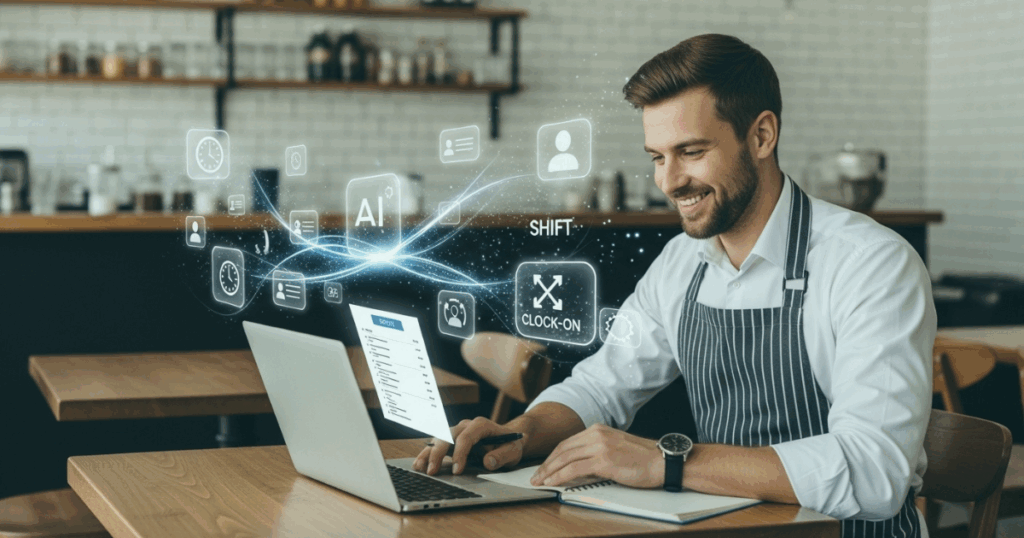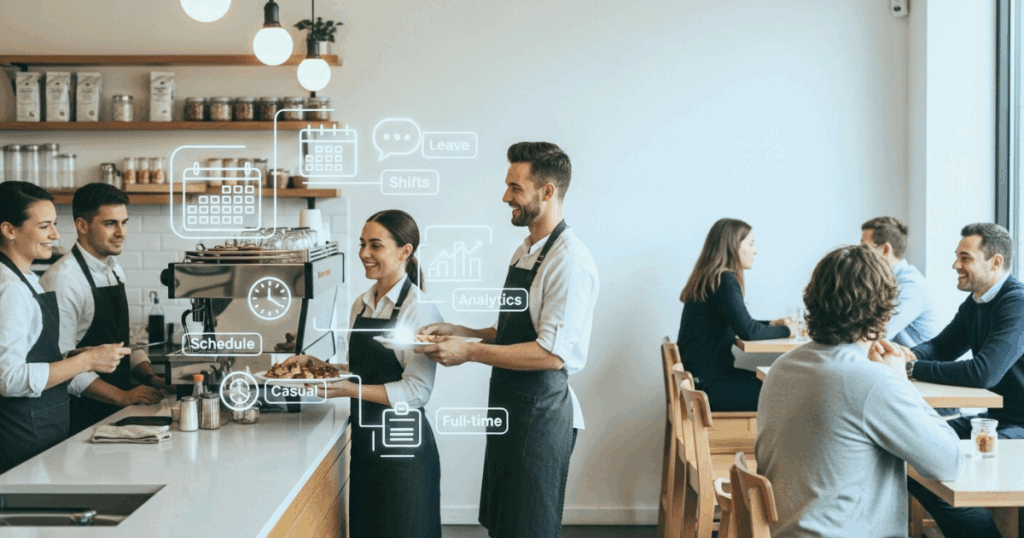The hospitality industry has always been built on people. The barista who remembers your name, the waiter who makes you laugh, the hotel manager who goes out of their way to make your stay special. These are the moments that turn a simple transaction into a memorable experience.
But behind the smiles and service, running a hospitality business is hard work. Stock to order, staff to schedule, rosters to manage, bills to pay—the list goes on. That’s where AI is stepping in.
In 2025, artificial intelligence is no longer just a buzzword reserved for big corporations. It’s becoming an everyday tool that cafés, restaurants, and hotels across Australia are quietly adopting to save time, cut costs, and improve service. And the good news? It’s not replacing people. It’s supporting them.
Here’s a look at what’s changing—and how you can use it to make running your hospitality business just a little bit easier.
How does AI personalise services in hospitality?
AI tools can track customer preferences, suggest tailored options, and send personalised offers, freeing staff to focus on delivering genuine, human service. 71% of consumers expect personalised interactions, and 76% get frustrated when they don’t receive them.
Smart ordering systems now “remember” customer preferences and can even suggest dishes or drinks they might like next time. Larger venues are using predictive analytics to send tailored offers, like letting a customer know about a wine night if they’ve previously ordered Pinot Noir.
For small businesses, this means you don’t need a massive loyalty program or a big marketing budget to make service feel personal.
Personalised service without the guesswork
Hospitality is about making people feel special. The problem is, when things get busy, even the most attentive team can struggle to keep track of who likes soy milk in their latte or which customer always orders gluten-free pasta.
AI can do the heavy lifting in the background, so you and your team can simply focus on delivering the warm, human touch that keeps people coming back.

How does hospitality AI reduce admin work?
AI for hospitality services automates customer inquiries, bookings, staffing, and inventory management, allowing hospitality teams to spend less time on paperwork and more time engaging with guests.
Less time on admin, more time with customers
Ask any café or restaurant owner what takes up too much of their week and you’ll hear the same answer: paperwork.
- Phone Inquiries: An AI Receptionist can answer common inquiries like pricing and opening hours, freeing your staff to focus on what matters most—serving your guests.
- Staffing: AI for scheduling shifts, managing time-off requests, chasing availability.
- Inventory: Guessing stock levels and re-ordering at the last minute.
AI tools are now helping to automate these pain points. Chatbots are answering basic customer questions (“What are your opening hours?”). Scheduling systems are building smarter rosters that account for peak periods, and stock systems are flagging when you’re likely to run low before you even notice.
The result? Less back office, more front of house. Instead of burning out on admin, you and your staff can spend more time where it matters—interacting with customers.
Can AI help hospitality businesses improve pricing strategies and margins?
Every business owner knows the balancing act: charge too little and you cut into profits, charge too much and you risk empty tables.
AI-driven pricing models are becoming the norm in 2025. These modals enable hospitality businesses to maximise revenue while keeping customers happy.
For example, hotels are using them to adjust room rates daily based on occupancy trends. Restaurants are experimenting with AI-powered menus that can highlight specials depending on what stock needs moving. Even small cafés are testing dynamic discounts for quiet hours—think “happy hour flat whites” at 3pm.
What used to be a guessing game is now backed by data, helping operators maximise revenue without alienating customers.
Does AI make sustainability more cost-effective for hospitality businesses?
AI can turn eco-friendly practices into efficiency wins:
- Food waste tracking: Systems measure which menu items get left unfinished and adjust portions accordingly.
- Smart energy use: AI optimises heating, cooling, and lighting to reduce bills.
- Inventory management: Smarter ordering reduces over-stocking and spoilage.
The result is sustainability that doesn’t just meet customer expectations but also puts money back into the business.
Exploring practical sustainability practices in hospitality
Sustainability is no longer a “nice to have”—it’s an expectation. Customers want to know that the businesses they support are doing their bit. But tackling waste and energy costs often feels overwhelming for small operators.
Over 50% of surveyed hoteliers invested in energy-efficient solutions, often using AI-enabled systems for real-time optimisation. There’s also been an increase in investments focused on minimising food waste through AI-driven planning and monitoring. That’s money back in the owner’s pocket while still meeting customer expectations around eco-friendly business.
How is AI making guest experiences more immersive?
With AI, the guest journey now starts well before they walk in the door. Here are a few ways hospitality businesses are applying it:
- AI-powered virtual tours let customers explore a restaurant’s interior before booking.
- AR navigation helps hotel guests find their way to their room or the gym.
- Real-time translation tools make it easier to serve overseas visitors.
- AI Receptionists can deliver consistent, professional interactions with every call, even after hours.
Don’t fall behind on immersive guest tech
Immersive guest tech isn’t just a flashy add-on. It’s quickly becoming a necessity in hospitality. Customers are now starting to expect digital convenience at every stage of their journey, from exploring a restaurant online to using voice assistants in their hotel room.
For many operators, these may sound futuristic, but they’re becoming increasingly affordable. In competitive markets, offering just one of these features could be what sets your venue apart.
The heart of hospitality AI is still human
With all this talk of AI, it’s easy to worry: will hospitality lose its warmth? The answer is no.
Technology is here to support, not replace. Customers don’t come back because a chatbot replied quickly—they come back because the meal was delicious, the service was friendly, and they felt welcomed.
The real power of AI is in giving business owners and staff the freedom to spend less time stuck in spreadsheets and more time on the floor, connecting with people.
And that’s something no algorithm can replicate.
Key takeaways
- AI in hospitality is growing fast in 2025, but it’s here to help, not replace people.
- Personalised service is easier with AI remembering customer preferences.
- Admin tasks like rosters, bookings, and stock are getting smarter and faster.
- Dynamic pricing helps businesses stay competitive and maximise revenue.
- Sustainability tools reduce waste, cut costs, and meet customer expectations.
- New guest tech, like virtual tours and translations, improves the customer experience.
- The human touch is still the most important part of hospitality.
Hospitality is tough. Payroll doesn’t have to be.
With Payroller, you get more than payroll. You get a smarter way to run your business.
- AI Rostering: Create rosters in minutes. AI assigns staff based on availability, cost, and your rules. It finds the right person for every shift, keeps budgets in check, spots conflicts, and even lets you save your own templates.
- Seamless manager and employee experience: Managers can build, adjust, and publish shifts with ease; employees get notified via app or email, accept or decline shifts, clock in/out, access payslips and timesheets—all synced with payroll.
- Streamlined payroll flow: Timesheets from shifts flow directly into pay runs, including STP reporting for the ATO. No more double-handling, no more fuss.
With Payroller, your rostering, payroll, timesheets, and compliance are handled in one simple platform, so you can spend less time on admin and more time doing what you love.
Ready to see how easy it is?
Try Payroller free today and experience the power of AI rostering, seamless payroll, and hassle-free compliance—all built with small business owners in mind.
